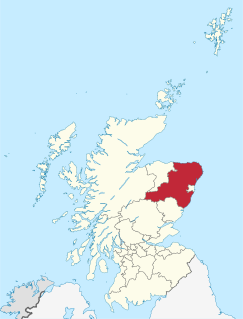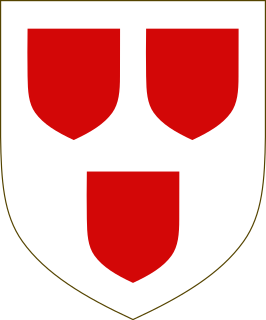Related Research Articles

Aberdeenshire is one of the 32 council areas of Scotland.

Craigievar Castle is a pinkish harled castle or fortified country house 6 miles (9.7 km) south of Alford, Aberdeenshire, Scotland. It was the seat of Clan Sempill and the Forbes family resided here for 350 years until 1963, when the property was given to the National Trust for Scotland by William Forbes-Sempill, 19th Lord Sempill in the 1960s.

Clan Barclay is a Lowland Scottish clan.

Clan Gordon, also known as the House of Gordon, is a Scottish clan. The chief of the clan is the powerful Earl of Huntly, and now also the Marquess of Huntly. During the Wars of Scottish Independence in the 13th century, the Gordons supported William Wallace in the cause of independence. In the 15th century, the chiefship of the clan passed to an heiress, who married into the Seton family and her male descendants assumed the surname Gordon and continued as chiefs of the clan. The Gordons assisted in defeating the rebellion of the Earl of Douglas also in the 15th century. In the 16th century, the Gordons as Catholics feuded with their Protestant neighbors the Clan Forbes and also defeated at the Battle of Glenlivet, the Protestant Earl of Argyll. During the Wars of the Three Kingdoms of the 17th century, the Gordons supported the Royalist cause. During the Jacobite rising of 1715 the Clan Gordon was Jacobite. During the Jacobite rising of 1745, their chief, then the Duke of Gordon, pledged his support to the British-Hanoverian Government, but his clan remained Jacobite.

Clan Hay is a Scottish clan that has played an important part in the history and politics of Scotland. Members of the clan are to be found in most parts of Scotland and in many other parts of the world. However, the North East of Scotland, i.e. Aberdeenshire (historic), Banffshire, Morayshire and Nairnshire Nairn (boundaries), is the heart of Hay country with other significant concentrations of Hays being found in Perthshire, especially around Perth, in the Scottish Borders, and in Shetland.

Urquhart is a Highland Scottish clan.
The personal name Duncan can be found in Scotland’s oldest records in its Gaelic form Dunchad/Donchadh/Donachie/Donnchadh and other spelling variants.

Clan Calder is a Highland Scottish clan. The clan is recognised by the Lord Lyon King of Arms but as it does not currently have a clan chief it is therefore considered an armigerous clan.
Clan Strachan is a Scottish clan originating from the barony of Strachan, in Aberdeenshire. The clan does not have a chief, therefore it is considered by Court of the Lord Lyon and the Stand Council of Scottish Chiefs as an Armigerous clan.
Clan Straiton, also called Straton or Stratton, is a Lowland Scottish clan. The clan does not currently have a chief therefore it is considered an Armigerous clan.

Clan Wood is a Lowland Scottish clan from North Esk, Largo Bay and Angus in Scotland.

Clan Forbes is a Highland Scottish clan from Aberdeenshire, Scotland.

Clan Craig is a Scottish clan hailing from Aberdeenshire. The clan does not have a chief recognized by the Lord Lyon King of Arms, therefore the clan has no standing under Scots Law. Clan Craig is considered an armigerous clan, meaning that it is considered to have had at one time a chief who possessed the chiefly arms, however no one at present is in possession of such arms.

Clan Bissett is a Scottish clan. The clan is recognised by the Lord Lyon King of Arms but does not have a clan chief recognised by the Lord Lyon King of Arms, therefore the clan has no standing under Scots Law. Clan Bissett is considered an armigerous clan, meaning that it is considered to have had at one time a chief who possessed the chiefly arms; however, no one at present is in possession of such arms. The surname Bissett is also considered a sept of the Clan Fraser of Lovat.

Clan Gardyne is a lowland Scottish clan from Angus. The clan does not currently have a chief therefore it is an armigerous clan.

Clan Cumming, also known as Clan Comyn, is a Scottish clan from the central Highlands that played a major role in the history of 13th-century Scotland and in the Wars of Scottish Independence. The Clan Comyn were the most powerful family in 13th-century Scotland, until they were defeated in civil war by their rival to the Scottish throne, Robert the Bruce.
Clan Tailyour, also known as Clan Taylor, is a Scottish clan. The clan is recognized by the Lord Lyon King of Arms but it does not currently have a clan chief therefore it is considered an armigerous clan. The surname Taylor is also considered a sept of the Clan Cameron of the Scottish Highlands who are descendants of Taillear Dubh na Tuaighe (b.1550), see: Taylor sept.

Clan Cheyne is a Scottish clan. The clan is officially recognized by the Lord Lyon King of Arms, however as the clan does not currently have a chief recognized by the Court of the Lord Lyon, it is therefore considered an Armigerous clan. The surname Cheyne is also recognized as a sept of the Clan Sutherland, and is accepted as such by the Clan Sutherland Society in Scotland.

Castle of Findon was a castle located in Aberdeenshire, Scotland.

Cullykhan Castle was a castle located in Aberdeenshire, Scotland.
References
- ↑ Clan Troup Profile scotclans.com. Retrieved 10 July 2021.
- 1 2 Coventry, Martin. (2008). Castles of the Clans: The Strongholds and Seats of 750 Scottish Families and Clans. p. 574. ISBN 978-1-899874-36-1.